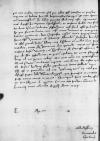⌊Daniel Mauchus⌋ Ulmensis, illustrissimi ⌊domini Georgii ab Austria⌋ principis et episcopi Brixinensis secretarius, mihi tuo nomine et salutem dixit et meas litteras a Tua Reverendissima Celsitudine requiri indicavit. Quorum primum ut erat exoptatissimum, ita postremum non mediocri dolore me affecit ms. effecit(!)
⌈affecitaffecit ms. effecit(!)
⌉, cogitantem nimirum, quam minime deceret me huiusmodi cessatio, ut officium meum in scribendo sit requirendum a patrono post homines natos optimo, quique in me ipsum tam praeclara edidisset benevolentiae argumenta, ut sine ingratitudinis scelere non possint dissimulari. Rursus cum in animum voco ipsius causae circumstantias, qui mihi conscius sum mentis ad omne obsequium expromptissimae, neque scivi quo scriberem, nec habui per quem scriberem, prope me ipse <absolvo> criminis, praesertim apud tam aequum iudicem, qui clementer malit ignoscere quam severiter condemnare clientem posthac suo muneri non defuturum, simul atque intellexerit, et qua et quatenus patroni desiderio possit satisfacere. Proinde etiam atque etiam gaudeo iam tandem inventam esse viam, qua litterarum beneficio per tot tantaque locorum intervalla liceat salutare virum integritate optimum, bonarum disciplinarum superinscribed⌈disciplinarumdisciplinarum superinscribed⌉ gloria celeberrimum ac etiam sine antistitis dignitate merito omnibus reverendissimum, tum etiam privatim sic in me liberalem ac beneficum, ut ex ea messe in omnem reliquam vitam non contemnendum fructum sim percepturus. Quod et ipse recognoscas licet. Siquidem nominatione imperiali ad praeposituram Hugardensem, quam Tuae unius Celsitudini debere confiteor, adeptus sum sacerdotium canonicum non minoris census in absentia, quod nos homines scholastici magis expetimus, quam sit canonicatus Antverpiensis. Pro hoc monumento perpetuae in me benevolentiae libenter referrem gratiam, si possim. Immo etiam hoc ipso magis cupio, quo minus licet. Proinde si quid obsequii hic animus tot beneficiis tibi obnoxius possit impendere, id mihi tuo iure imperabis. De rebus publicis nihil audeo ad te scribere. Neque enim dubito, quin Tua Reverendissima Celsitudo haec ab his resciscat,
 AAWO, AB, D. 3, f. 49v
qui non audita narrant, sed qui rebus ipsi intersint et praesint, maxime cum habeas hic ⌊dominum Brixinensem⌋, ut aequum est, inter optimos tui amantissimum. In rebus privatis illud novi est, ⌊Gemmam⌋ tuum duxisse hic uxorem lepidissimam, eo corporis habitu, ut facile ter denis Gemmis videatur suffectura, nisi simul esset pudicissima. Ex qua, favente Lucina, non nisi meros uniones et margarita<s> putatur geniturus. Item ⌊Campensem⌋ nostrum initio proximi mensis pervenisse ⌊Venetias⌋ ad ⌊Hieronymum Aleandrum⌋, archiepiscopum Brundusinum hidden by binding⌈[um]um hidden by binding⌉, et ab... illegible⌈...... illegible⌉ quendam Iudaeum Eliam, cuius desiderio iam multis annis prope contabuit, tanta siti iam superinscribed⌈iamiam superinscribed⌉ per novem dies extincta. Tanto enim spatio temporis haesit ⌊Venetiis⌋, cum significaret se satis esse assecutum illa, quae ab Elia exspectarat et quorum cupiditate tot annos flagrasset iamque ad nos parare reditum. Qui certe nobis erit exoptatissimus. Quod si veterem condicionem requirat, non deerit illi ms. illa(!)
⌈illiilli ms. illa(!)
⌉ nostra opera. Dominum ⌊Erasmum⌋ hactenus frustra exspectavimus toties pollicitum reginae sese esse in procinctu ad nos. Voluntati tamen eius nihil puto obstitisse praeter bellum Wirtembergense, quo principes et civitates prope omnes erant in armis. Quicquid porro accidat, efficiam ne Tua Reverendissima Dominatio ignoret. Cui me toto pectore commendo.
AAWO, AB, D. 3, f. 49v
qui non audita narrant, sed qui rebus ipsi intersint et praesint, maxime cum habeas hic ⌊dominum Brixinensem⌋, ut aequum est, inter optimos tui amantissimum. In rebus privatis illud novi est, ⌊Gemmam⌋ tuum duxisse hic uxorem lepidissimam, eo corporis habitu, ut facile ter denis Gemmis videatur suffectura, nisi simul esset pudicissima. Ex qua, favente Lucina, non nisi meros uniones et margarita<s> putatur geniturus. Item ⌊Campensem⌋ nostrum initio proximi mensis pervenisse ⌊Venetias⌋ ad ⌊Hieronymum Aleandrum⌋, archiepiscopum Brundusinum hidden by binding⌈[um]um hidden by binding⌉, et ab... illegible⌈...... illegible⌉ quendam Iudaeum Eliam, cuius desiderio iam multis annis prope contabuit, tanta siti iam superinscribed⌈iamiam superinscribed⌉ per novem dies extincta. Tanto enim spatio temporis haesit ⌊Venetiis⌋, cum significaret se satis esse assecutum illa, quae ab Elia exspectarat et quorum cupiditate tot annos flagrasset iamque ad nos parare reditum. Qui certe nobis erit exoptatissimus. Quod si veterem condicionem requirat, non deerit illi ms. illa(!)
⌈illiilli ms. illa(!)
⌉ nostra opera. Dominum ⌊Erasmum⌋ hactenus frustra exspectavimus toties pollicitum reginae sese esse in procinctu ad nos. Voluntati tamen eius nihil puto obstitisse praeter bellum Wirtembergense, quo principes et civitates prope omnes erant in armis. Quicquid porro accidat, efficiam ne Tua Reverendissima Dominatio ignoret. Cui me toto pectore commendo.
 AAWO, AB, D. 3, f. 49v
qui non audita narrant, sed qui rebus ipsi intersint et praesint, maxime cum habeas hic
AAWO, AB, D. 3, f. 49v
qui non audita narrant, sed qui rebus ipsi intersint et praesint, maxime cum habeas hic 

